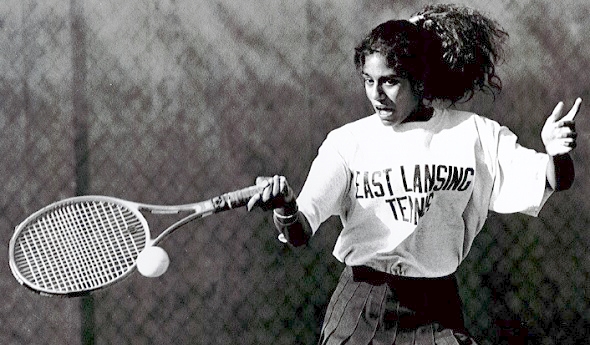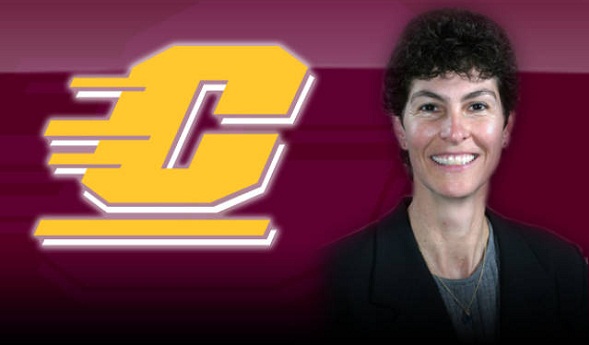
On Call as Doctor, Director, Mom
By
Geoff Kimmerly
MHSAA.com senior editor
October 31, 2013
By Geoff Kimmerly
Second Half editor
Dr. Kiran Taylor is in her 10th year as a practicing psychiatrist and specializes in providing therapy to cancer patients and family members who care for them.
 Taylor is the medical director of the Supportive Care Medicine Clinic at Spectrum Hospital’s Lemmen-Holton Cancer Pavilion in Grand Rapids. She's also the Chief of Psychiatry and Behavioral Medicine for the entire Spectrum Health System, which includes 11 hospitals and nearly 200 ambulatory and service sites all over the western Lower Peninsula.
Taylor is the medical director of the Supportive Care Medicine Clinic at Spectrum Hospital’s Lemmen-Holton Cancer Pavilion in Grand Rapids. She's also the Chief of Psychiatry and Behavioral Medicine for the entire Spectrum Health System, which includes 11 hospitals and nearly 200 ambulatory and service sites all over the western Lower Peninsula.
And Thursday, she made sure to schedule a trip to her children’s school for the Halloween parade and costume parties.
Balancing is a daily requirement for Taylor (formerly Khanuja), an MHSAA Scholar-Athlete Award winner as an East Lansing senior in 1994. But the skills she learned as a tennis standout for the Trojans and at the University of Michigan are those she relies on still as a doctor, director and Mom.
“My high school athletic experience impacts all areas of my life,” Taylor said. “I think about the journey of those experiences and how those changed me.
“The discipline and time management skills you have to have as a scholar-athlete, to pay attention to school and pay attention to your sport, those are certainly skills I carry with me today.”
Taylor was one of 20 scholar-athletes recognized that winter by the MHSAA and  Farm Bureau Insurance, which continues to sponsor the award program that has grown to 32 recipients. In advance of this March’s 25th celebration, Second Half is catching up with some of the hundreds who have been recognized.
Farm Bureau Insurance, which continues to sponsor the award program that has grown to 32 recipients. In advance of this March’s 25th celebration, Second Half is catching up with some of the hundreds who have been recognized.
Taylor advanced as far as the Lower Peninsula Class A No. 1 singles championship match during her high school tennis career, finishing runner-up at the top flight her junior season. She already had an interest at that point in health and an understanding of what went into playing at a high level, and was most interested in sports medicine and orthopedics when she began medical school, also at U-M.
But as she got a little deeper into her studies, Taylor discovered a path that seemed more in line with her personality.
‘Natural fit’
A video bio of Taylor on the Spectrum Health website includes her explaining that she chose psychiatry because it’s an area that allows her to empower patients to help themselves. In her line of work, she not only heals but aspires to help those in her care reach their potential.
“When they’re helping themselves, they’re helping others, they’re helping their communities,” Taylor said, “and the impact is endless.”
While at U-M, Taylor found a mentor in Dr. Michelle Riba, the director of the PsychOncology program at U-M’s Comprehensive Cancer Center. Her work, like Taylor’s at Spectrum, centers on treating patients in their dealing with the emotional issues that come with cancer diagnosis and treatment.
Taylor’s role as chief of psychiatry and behavioral medicine for the entire Spectrum system allows her to affect a patient’s entire care by making more accessible treatment for emotional and well as physical needs.
There are days she comes home after working with a patient facing especially somber circumstances, and through her medical training has learned how to keep those sad situations from affecting her personally.
But there also are days when she’s had to deal with a difficult managerial situation, and during those times she taps into the skills she learned while on the court.
"You manage adversity on a tennis court. It could be a tight match, or you're up 5-0 or down 5-0," Taylor said. "It's a microcosm of the world.
"If I have a challenging colleague or someone with a different opinion in a meeting, I tap into knowing how to deal with adversity."
Pass it on
Taylor, 37, remains tied to a few from her Scholar-Athlete Awards class. She has known Okemos winner Andy Dhaliwal since childhood and he is now a doctor too, having also graduated from U-M. Jackson winner Harland Holman is a family physician in Grand Rapids and also part of the Spectrum Health system, and knew Taylor's husband through wrestling.
Karin is married to Dr. Joe Taylor, quite a former scholar-athlete himself – he was a standout wrestler at Charlotte before graduating in 1995 and going on to study at U-M.
Thanks at least in part to their parents’ inclination toward sports, the Taylor kids are beginning to try some out. The oldest is 9, the same age as when Kiran first picked up a tennis racket.
For this, Taylor also is prepared thanks to her high school and college careers. Considered together, they give her a long perspective when it comes to kids and sports.
“(It’s about) letting them figure out what they’re interested in, letting them explore. They want to pay attention to things or don’t; watching them unfold was fun,” Taylor said. “It’s about understanding the road, and that’s what high school athletics did, and going on into college athletics. They helped me understand it’s a long road. You don’t have to start your kid at 4 and have the best at 7.”
And it's a road she advises this year's Scholar-Athletes to appreciate now as they pick up knowledge they'll use for a lifetime.
“The lessons they’re learning now, and how they conduct themselves – being a scholar-athlete, I think, is about the way you conduct yourself – those are the skills they will take with them no matter what they do at any point in life,” Taylor said. “That’s what being a scholar-athlete has done for me.”
Click to read the series' first installment:
25 Years Later, Scholar Athletes Shine On
PHOTO: (Top) Kiran Khanuja returns a volley during a tennis match while at East Lansing High School. (Bottom) The MHSAA Scholar-Athlete Award class of 1993-94 included Khanuja, seated fourth from left.


Lessons Learned Keep Paying Off
February 8, 2013
By Terri Finch Hamilton
Reprinted with permission of CMUChippewas.com
Gina Mazzolini's parents taught her to be a good person first, a good student second, and a good athlete after that. But Mazzolini says her involvement in sports at CMU taught her things that went way beyond the classroom.
"At Central, I learned women are just as good as men -- or better," says Mazzolini, assistant director at the Michigan High School Athletic Association. "I learned that if we put our minds to it, we can do anything."
A star athlete in volleyball and basketball at CMU from 1974 to 1978, Mazzolini says college sports helped her soar after the limitations for girls in high school sports in the early 1970s.
"In high school, women were always taking the back seat to men," says Mazzolini, 57. "I didn't see women in leadership positions in high school. Girls couldn't use the weight room -- we had to sneak in, then we'd get kicked out. They'd look at me and say, 'Why would you want to lift weights?'
"When the guys were done with the gym, then we could use it."
As an athlete at St. Johns High School, Mazzolini was just starting to compete competitively, she says. She won the school's first ever female athlete of the year award.
"Then I went to Central Michigan, and my teammates were all the best kids from their high school teams. Suddenly, everybody was good. And everybody we played against was good."
It was eye opening, she says.
"You learn a lot about yourself," she says. "If you can survive a practice, if you can survive playing Michigan State, you get confidence. I realized I was good. I learned how to be competitive, in a good way."
In basketball, she led the Chippewas in scoring and rebounding three straight seasons - averaging in double figures in both categories. After graduating from CMU, Mazzolini went on to teach and coach at the high school and college levels. She was inducted into the CMU Athletic Hall of Fame in 1992.
A few years later, Mazzolini received the 2009-10 Women In Sports Leadership Award by the Representative Council of the MHSAA.
So much of what she learned on the college volleyball and basketball courts prepared her for later success, Mazzolini says.
"In athletics, you can't worry about what just happened," she says. "You control your emotions, you take a deep breath, you move forward."
Good advice on any day, she says.
"You learn that you don't always win, and you learn to take defeat gracefully," she says. "Later, in your business life, you're not going to win everything, either. Sports teaches you how to deal with setbacks, how to work hard and rearrange your goals so that you do better next time.
"You learn if you work together, you can achieve amazing things."
CMUChippewas.com is running a series of stories to celebrate the 40th anniversary of Title IX legislation. Click to see more of the series.

